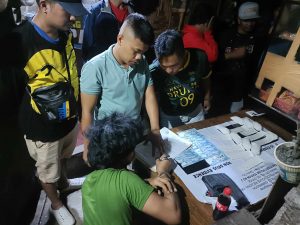A government official here has urged the public to be wary of illegal housing subdivision projects in the region.
Department of Human Settlements and Urban Development (DHSUD) Davao officer-in-charge Miguel Palma Gil said they are currently going after illegal housing projects developers in the region, particularly in the city.
“Don’t buy units in housing projects if there is no license to sell,” Gil warned the public during the Connect Media Forum at SM Premier Lanang on Friday.
He said developers are subdividing lots even without license and development permit.
Gil said they have been following after those illegal subdivision projects in barangays Indangan and Communal in Buhangin District here, as well as housing projects in Island Garden City of Samal in Davao del Norte.
Gil said the DHSUD and the City Planning and Development Office (CPDO), represented by Assistant Coordinator Roy Ryan Rigo, conducted last Thursday a joint inspection in Barangay Communal “as they were ordered by the city mayor (Mayor Sara Duterte) to look into (a certain) problem.”
Initially, the complaint was about a blocked canal.
But the inspection led to the discovery that the subdivision is an illegal project.
Gil noted that most of these illegal housing subdivision
projects do not have “proper canal systems, proper road system, and proper road networks.”
The DHSUD officer said they are yet identifying the unregistered developer.
“I asked (the residents) who sold the property but they could not name the seller,” Gil said, adding the developer obviously does not have a license.
He said they are now initiating the filing of administrative and criminal cases once they could pinpoint the illegal developers.
“It’s estafa,” Gil said.
Asked if there are other illegal subdivision projects in the city, Gil said “before, it was only 17, but now I heard it’s increasing.”
Gil noted that there are many existing housing developers in the region who are into illegal activities of such projects in a “piecemeal approach.”
Piecemeal approach refers to the unsystematic or fragmentary measure of dividing and acquisition of a particular land property.
“They subdivide but there is no proper road, no line of electricity, no water,” Gil said, stressing that many buyer are enticed because the properties are being sold at a low price.
Samal, he said, is “suffering in these kinds of illegal subdivision projects.”
He also revealed that the proposed road networks in the island have not been materialized because the areas were already converted into subdivisions.
“The supposed roads were converted into housing subdivision without coordination of local government,” Gil said.
During a meeting last Feb. 14, Gil said he asked Housing Sec. Eduardo del Rosario to strengthen Task Force P.D. 957 that goes after illegal subdivision developers and to file complaints against them.
“Because they (developers) are mandated by the law to provide the minimum standards set under B.P. 220 and P.D. 957 to their clients,” Gil said.
Presidential Decree (PD) 957 is the law regulating the sale of subdivision lots and condominiums in view of the increasing number of incidents wherein “real estate subdivision owners, developers, operators, and/or sellers have reneged on their representations and obligations to provide and maintain properly” the basic requirements and amenities, as well as “reports of alarming magnitude….of swindling and fraudulent manipulations perpetrated by unscrupulous subdivision and condominium sellers and operators.”
Batas Pambansa (BP) 220, meanwhile, authorizes the Housing and Land Use Regulatory Board (HLURB) to establish and promulgate different levels of standards and technical requirements for the development of economic and socialized housing projects.
High-rise buildings
Gil clarified that there are no high-rise buildings or projects involved in these kind of illegal activity as the construction of these buildings can immediately be noticed by government authorities.




